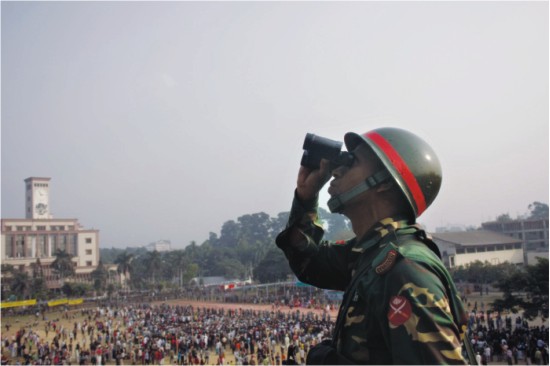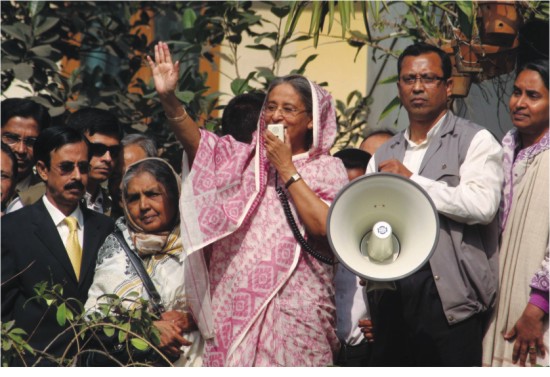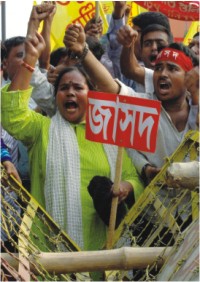
Inside
|
The 1/11 Paradox Rashida Ahmad reflects on how an undemocratic government presided over Bangladesh's freest elections since independence
Don't let democracy be undermined again, the prime minister has repeatedly warned since she came to power two months ago. Don't let un-democratic forces, extra-constitutional powers hold sway again. People need to be watchful for "behind the scenes," "back-door" attempts to choke, stifle, or derail democracy again. We must be on our guard. Now the gratitude for a "free and fair election" has worn off, Sheikh Hasina's verbal attacks grow more vociferous against the plottings of those who enforced two years of caretaker government rule, a rule made possible by extra-judicial powers under a state of emergency. But a rule, nevertheless, which ended in the freest, fairest and most peaceful elections --by all accounts that count -- ever to be held in Bangladesh. And one that brought Awami League to power in a stunning landslide victory. And there lies the rub. There is no overlooking the fact that the twisting, turning machinations of the "undemocratic forces" that held sway for two years, ended in a "victory for democracy," a victory for Hasina, a victory for the people. And a near-wipeout for Khaleda Zia's BNP whose two (non-consecutive) terms from 1996 resulted in a decade of misrule that brought the country to its knees by 2006. It's not difficult to sympathise with Hasina's present rhetoric against a regime that imprisoned her and then propelled her to power. It can't be easy to reconcile those two extremes. It's all the easier to sympathise because as a nation we are faced with a parallel dilemma. How to reconcile two years of emergency rule that curtailed people's fundamental rights in order that they may go to polls and exercise their voting right freely? How to evaluate the actions of an unconstitutional government that remained in power with the backing of the military, but whose professed task to bring about a peaceful election and restore democracy was fulfilled beyond all expectations? With all that has been written about "change" and the restoration of democracy, we cannot forget that both were brought about through a drastic "changeover" to a regime that imposed emergency powers and far surpassed its constitutionally mandated 90-day period for holding elections. The questions arise in trying to resolve the dilemma: Could the caretaker government have held elections within three months? Would early elections have been as peaceful or credible? Given that the caretaker government arguably went beyond its constitutionally mandated term, can we validate the late elections as a successful "transition back to democracy"? If we do, can we accept some of the actions during those previous two years while rejecting others as "unconstitutional"? Fakhruddin Ahmed's administration took some major wrong turns on the path to elections, and allowed or was directly responsible for political terror tactics, extra-judicial detentions under special powers, including that of Hasina and Khaleda, and other forms of human rights abuses. Its actions beyond the call of duty have been seriously questioned by experts citing the constitution: the non-party caretaker government shall discharge routine functions only and cannot make policy decisions. The 100-plus ordinances promulgated during the two years have mostly been rejected on the same grounds. Though these grounds start shifting when we look at the number of ordinances that have been approved by the new government, which go beyond those that were required for "routine functions" and holding elections. The caretaker government's argument was that all its actions, from rounding up politicians and trying corruption cases under special powers to judicial and administrative reforms, were necessary for ensuring free and peaceful elections. But, the ends-justifying-the-means argument is too simplistic for most to stomach. But it is all too often countered with two points that are just as simplistic. The first is based on the unassailable belief that the ballot-box has an intrinsic value and an elected government, through a "free and fair" vote, is in itself sufficient to lay a claim to "democracy." The second is the "floodgate" argument: any disruption to the democratic process undermines the process and opens the way to further disruptions under a so-called "doctrine of necessity." Both arguments assume that democratic processes had at some point taken root in Bangladesh. And this is debatable. Even our politicians are shaky on that assumption. While it's hard to argue that a non-elected government could in any circumstances bring good, we could, in a pragmatic approach, consider the people's expectations. The people's expectation of the caretaker government was that it would deliver free and fair elections and many were willing to live with "curtailed freedoms" to that end for as long as it took. And despite, or perhaps because of its lengthy term, the caretaker government delivered. People's expectation of an elected government is that it will deliver democracy. A great expectation, and one that was paid much lip service by parties in the lead up to and post-election. Again, the "democratic process" was invoked.
Well, the years 1991-2006 marked 15 years of "uninterrupted democracy" in Bangladesh. But instead of nurturing democracy, those fifteen years cumulatively brought about a near-failed state by January 11, 2007. Looking back at those, and the years 2007-08, it's difficult to pinpoint when democracy was delivered/interrupted or when basic freedoms were guaranteed/curtailed. If we consider political violence, reigns of corruption, and undemocratic institutions -- we could be talking of any period from 1991 to 2006. The fact that during those years elections and power handovers, which are only the start of the democratic process, sparked break-downs in law and order and political chaos, means our elected governments don't score high on any table of democratic fundamentals. A military-installed government by definition bypasses the democratic process. But neither do ballot-boxes, a parliament building, or a paper constitution guarantee that process. Our periods of elected government have witnessed extra-judicial detentions, corruption, and failures of justice. And the Bangladeshi people 38 years after independence, with or without democracy, have yet to see their economic, social and political rights guaranteed. Those of us who: (a) are not politicians, (b) were not involved in "behind the scenes" plottings, (c) did not conceal illegal wealth, and (d) are relatively non-partisan might rather ask what was the qualitative difference between the last two years and the preceding fifteen? What freedoms in reality were curtailed? Past hartals and political violence have restricted our
freedom of movement as effectively as two short periods of curfew imposed under the caretaker government. The unchecked dogma originating in the histories and ideologies of our two main parties curtails freedom of thought as effectively as any unconstitutional power. When partisanship under our elected governments guarantees power like nothing else, how are political rights ensured? And when being in government means hitting the jackpot for self and loved ones, how are the interests of ordinary people guaranteed? All this still begs the question: can the ends ever justify the means, when the means is a suspension of the democratic process? But this is in reality such an abstract question, it falls into the realm of philosophy. Let us say instead the blame for our present abject state of democracy cannot be laid exclusively on past military regimes. Democracy has been undermined enough by past elected governments. The prime minister herself has conceded as much, blaming opposition BNP with no holds barred for its past years of poor governance, misrule, and corruption. And let's not forget we were here before, in 1991. A restoration to democracy that brought that government in on the crest of high hopes. Well it's Awami League's time now. And if we look to public opinion, including the media, we are rooting for this government's promised vision. With the country geared up for a sea-change to match her landslide victory, let's hope the prime minister is more concerned with the future than looking to the past, a future where uninterrupted democracy can this time take root through the power of a true people's victory. Rashida Ahmad is a Dhaka-based journalist. |


